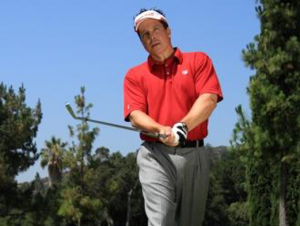
Are you trying to break into the sports industry? If so, you probably already know that sports jobs are highly competitive! When you throw your name in the hat for that highly sought after position, the fact is that you are likely one of a thousand applicants. So, how do you stand out in the crowd and ensure that when you get your shot, you have the mental toughness to land your dream job?
Rick Sessinghaus – Golf’s Mental Coach
Meet Rick Sessinghaus. Rick is best known as “Golfs Mental Coach”. He specializes in increasing people’s performance in their personal, business and athletic careers through speaking, training, and coaching. Rick founded Sessinghaus Performance Systems Inc. with the purpose of helping others realize their full potential and live their dreams.
I had the pleasure of speaking with Rick and asked him to provide his insight on how mental toughness is not only beneficial for professional athletes, but can also provide the edge needed to excel in the sports industry. In this interview, Rick discusses:
- Why some performers play great on the biggest stage and why some choke
- Why you need to rehearse scenarios before they happen to get what you want
- The value of knowing your strengths and why you should focus on becoming an expert in one niche
How Mental Toughness Can Help You Excel In Sports Business
Connect With Rick Sessinghaus – Golf’s Mental Coach
 Rick is the expert on the mindset principles that make or break performance on and off the course. His coaching has helped top junior, collegiate, and professional golfers reach new levels of performance. In his book, “Golf – The Ultimate Mind Game“, Rick maps out the mental and emotional skills needed to play your best golf. Throughout this book you will be learning the latest performance psychology skills to improve how you perform on and off the golf course.
Rick is the expert on the mindset principles that make or break performance on and off the course. His coaching has helped top junior, collegiate, and professional golfers reach new levels of performance. In his book, “Golf – The Ultimate Mind Game“, Rick maps out the mental and emotional skills needed to play your best golf. Throughout this book you will be learning the latest performance psychology skills to improve how you perform on and off the golf course.
- Rick Sessinghaus – http://ricksessinghaus.com
- Seminars, Corporate Events & Workshops – http://www.ricksessinghaus.com/seminars/
Mental Toughness With Rick Sessinghaus – Video Transcription
Trevor
Hey everyone it’s Trevor Turnbull here from Sports Networker and I’m excited to talk to you guys today and introduce you to Rick Sessinghaus. How’s it going Rick?
Rick
It’s going great today. How are you doing?
Trevor
Really good. Thanks for asking. Rick is known as golf’s mental coach. We actually connected a few days ago and thought it would be a great idea to chat with him about what he does and how it relates to our audience of how to try and break into the sports industry or taking your sports career to the next level. I’m going to read a little quick bio on Rick here and then we’ll get to know him a little bit better.
Rick specializes in increasing people’s performance in their personal, business and athletic careers through speaking, training and coaching. Rick founded Sessinghaus Performance Systems Inc. with the purpose of helping others realize their full potential and live their dreams. So Rick, tell us a little bit more about your background. How did you get into all of this kind of stuff?
Rick
Well I was an athlete as a kid and got into a lot of sports. I’ll give my quick career here in a nut shell. I played some high school sports, got hurt in football, put all my attention into golf. My goal was to play college athletics and I was fortunate enough to walk on at Cal State Northridge here in California and played and earned a scholorship there. Then something interesting happened as I shifted into the professional world, I wanted to play professional golf. Well everybody is very good at that level. I noticed that physically I had a lot of the talents, but mentally and emotionally I wasn’t ready and it put me on a quest to now learn more. So I went back to school, got my masters and doctorate in applied sports psychology and just really wanted to know why some performers play great in the biggest environments and why some performers, well, choke in other situations. So I wanted to know more about that and I did and I started coaching more and more golfers and athletes on how to perform under any situation. I wrote the book Golf: The Ultimate Mind Game and I’ve been fortunate here in Burbank, California to have a growing business for mental game coaching and training
Trevor
So your office is currently in California then? I was reading through all your accolades and background and everything, and it’s a long list so I wont go through all of it but we’ll definitely put it in the article, but you’re a director of instruction at the Chevy Chase Country Club in Glendale, California is that correct?
Rick
Correct. It’s a fun little 9-hole country club just outside of Los Angeles and it allows me to take clients out on the golf course to give them hands-on golf instruction. Part of that coaching is the mental side of the game and I’ve done a lot of business trainings there also where I use golf as a metaphor for learning in the business environment also.
Trevor
Right. So you’ve worked with athletes in the past, you obviously work in the business side of it as well. We were talking before this interview about some examples that we can use too and the Tiger Woods one is the obvious one, and I’ll let you speak to this, but we were also referencing some other key things that have happened in sports recently.
I mentioned that Novak Djokovic was interviewed right before the final of the Australian Open and and he was asked, “what was the one thing that helped you rise to that next level in your sport?” and he referenced the mental game. There was a point where he realized that he could beat anybody in the world and thats kind of what took him to that next level. Do you have any other examples of how that relates to the business side of things and and maybe speak directly to the Tiger Woods scenario? Most people are familiar with that.
Rick
Sure. I think with the tennis analogy here is we’ve now had somebody who has been ranked third and fourth in the world for a while and never could break through. Then finally when he makes this understanding that “I know I can beat anybody,” that belief now leads to this unbelievable confidence and then you just go on all cylinders. But if we have doubt about our abilities and our skills it will hurt performance. We then put other people on pedestals, we compare too much instead of knowing that the skills I have today are good enough to win.
Tiger is an interesting story because he was trained at an early, early age to be mentally tough and he had a sport psychologist when he was 8, 9, 10 years old. You fast forward through the first part of his career and he dominated and most people would say he was the most mentally tough athlete there was. Now we know what has happened to him off of the course and it has affected his performance. He went all the way down to I think 50th or 60th in the world and most people say it’s because he got hurt or he has a new swing instructor. No. It’s because his belief in himself was no longer there and he said this year that he believes he is back. That’s going to be very powerful and we’re starting to see him improve.
On the other end of the scale, we’ve just had the NFL Playoffs going on. The Baltimore Ravens kicker at the end of regulation to go into overtime misses a fairly straightforward field goal. He’s done it thousands and thousands of times yet in that moment when it was needed he did not execute. Reading the background of what was happening on the sidelines he felt rushed, he didn’t even know it was fourth down, the coaches were yelling for him and then he runs out there. When the mind is racing, the body is racing also and the mind-body connection said he wasn’t ready. And he went through it very, very quickly, he hooked it to the left, the Ravens lose, and he probably doesn’t have a job anymore. It’s because he wasn’t ready for that moment. I think business people where we have business presentations, we have sales, we have conversations; if you’re not ready in that moment, they’re going to find somebody else. So you have to learn how to execute when it matters most.
Trevor
So what would you say is a best-practice approach to mentally preparing yourself for certain moments. In the sports world, as a kicker, the spotlight is on you, you’ve got a split second to get out on the field and kick that field goal. But really if he was mentally prepared I’m sure he was envisioning that kick every single day right? Before the game he’s thinking about his motions and all that kind of stuff. As it relates to the business side of things you’ve got to think, maybe even somebody trying to land a job in sports for example, you’ve got to go through a certain process. The interview and trying to prove that you know what you’re talking about and all that kind of stuff. Is there a way to translate that into people trying to break into the industry or trying to become a better manager, whatever it happens to be?
Rick
You said a key word there – envision it before it even happens. Part of being mentally prepared is to rehearse scenarios. In this case, in the business world, whether you’re going in for an interview, you better be prepared to know who’s interviewing you. What’s the company all about? You need to be prepared for different questions in the industry. You also need to be prepared to talk about your strengths and talk about how you would make a difference. You run those scenarios in your head over and over again and you will come up with better and better and better answers.
So now, one, any question that comes to you is not a surprise and, two, you will now have better answers to bring back. So mental rehearsal is something that has been used in sports for a long, long time; it started with Olympic athletes in the Soviet Union and now pretty much every elite athlete will mentally rehearse their performance before they do it. Part of that makes you comfortable. Because if you’ve done that over and over and over again it’s no big deal now when you’re actually doing it. The mind and the body doesn’t know the difference between what’s real and imagined so if we’re imagining it over and over again you are actually feeling the anxiety and the fears and then you can deal with them better because hey, you’ve rehearsed it. And you’ve prepared and you’ve practiced. So I think the idea of mentally preparing for something is underutilized and so I tell a lot of people about “if-then” scenarios. If this happens, then I do that; you’re ready for a lot of different situations that could happen. Some are bad, some are good, but you’re now ready to perform.
Trevor
Yeah. Well we actually speak to this in a lot of the Webinars and stuff that we do too. This is really the power of some of these social tools like LinkedIn that people can take advantage of. You talk about preparing for an interview right? Understanding the job that you’re applying for, the person that you’re going to be meeting; knowing their personality type and their background and their story and stuff; it goes a long way to be able to break the ice and be feel comfortable walking into any situation. That’s definitely something we preach here at Sports Networker as well.
So I’ve got another question; we get asked this one a lot from our audience and I actually didn’t give you a heads up on that one but I’m going to fire it out at you anyway Rick. A lot of people ask us, and they’re trying to break into the sports industry but the sports industry is pretty widespread right? There’s ticket sales, there’s marketing, there’s sponsorship, there’s events, there’s all these different things. We get asked a lot, “is it important to focus on one thing and be really good at it or do you try and learn a little bit about everything and break into the industry that way.” What would your take be on that from the mental coaching side of things?
Rick
I’ll give you my personal opinion on how it’s affected my personal profession. When I first got into performance coaching I felt I could be everything to everybody; I’ll just market to everybody. It didn’t work. Then I went back and I had an agent who books my speaking engagements and she just said, “go to your strengths. What do you know do well?” And I said golf obviously, I’m a professional player, I’m a PGA member, I’ve been in the business my whole life. So I needed to now specialize and when I did that, it’s interesting, yes I became known as golf’s mental coach and in my area a lot of top juniors and college players come to me because they know I know the game. I have instant credibility with them, instant repor with them and it helps my coaching. The byproduct of that is when I’m getting great results in my strength, other people come to me and say, “well do you work with students with piano?” or, “do you work with them taking tests?” and I go “yes because performance is performance and it doesn’t matter in what area” and they go, “oh great.” So that’s how I’ve done it, because it really helped me, is go to my strengths, be an expert in one area, and for me I know it can go to many other areas. I have to dominate my part of that industry first. So that’s what’s worked for me, and I think we’re getting more and more niched anyway, so if you can own a niche then people will know how to find you.
Trevor
Yeah. That’s great advice and we actually speak to that here as well with the idea of picking that one area and researching and connecting with people that are in that space and even starting a blog from an individual perspective to showcase your expertise in a certain area. It really kind of puts it out there because other people are Googling your name when you’re walking in for that interview too and whatever you put out there is a direct reflection of how you might perform as an employee or whatever it might be.
Rick what would you say is the main focus for your business right now? Just to give a sense, like you said focus on what you’re good at, which is obviously the golf side of things and how it relates to mental coaching. Where would you say your main focus is at right now and how people can connect with you to get the most value from what you have to offer.
Rick
Well, like I was saying, because I concentrated on my niche what ended up happening is now I own that niche in my area. I’ve been very fortunate; that part of my business is growing strong and it has a great foundation for what my next level of my business is which is corporate retreats and corporate training. Still using golf as kind of the metaphor for learning. How often do we go to a convention and there’s some form of golf being played or a boss plays or a sales meeting revolves around golf. Well again I want to own that niche now. Being able to use those performance skills that I use with golfers and now, into the business world, they’re the same. I’m just going to be talking in a little bit different language. So really what I’m going with is doing business-types of training and working with people on focus and confidence, emotional control, communication, those types of things that are vital for us to succeed in our business.
Trevor
Yeah. And you also mentioned, I’m just going to look at your bullet points here, you also mentioned neuro-linguistic programming as well. We don’t need to get into the great detail of that but maybe tell people a bit about that. I’m familiar with the term but I can’t even say that I know it greatly but I know people that have gone through that type of training before and seen amazing results from it. Maybe give us some insight into that.
Rick
Sure. NLP, neuro-linguistic programming, was made famous mostly by Tony Robbins, the motivational speaker. Two things that I really got out of it was, one, communication. How we communicate to ourselves is going to be a reflection on the results that we get. Every one of us has a different reality in life and we need to respect everybody else’s reality but what’s the reality you’re creating. Some of that is what you’re communicating to yourself on a daily basis. So it’s a lot of stressing on how you communicate, how you see the world.
The other idea I love about it is the idea of modeling excellence. It’s the idea that somebody has done it, they now have a recipe or a blueprint, I copy it and I get the same results. What I’ve found is it cuts down the learning curve if I have a model to copy. And you see this with so many different businesses. If I know I’m going to go one through ten and do all these things I’m going to get a really good result, then do them. So part of NLP is modeling excellence to get the results you want. Sometimes we try to reinvent the wheel instead of saying it’s already been done so let’s copy it and then be who we are in the process.
So that’s kind of the two main things; there’s a whole bunch of other stuff and other techniques that are used but those are the two main things; how we communicate to ourselves, we can always shift that to get a different reality, and then also we can model excellence. We can pick from greatness of what others have achieved, learn from that and copy it.
Trevor
I think that’s great advice for all the entrepreneurs out there because I know I’ve been defining myself as an entrepreneur for the last six or seven years and when I first started out I thought I had to redefine the model. Me against the world; I didn’t want any tips, no advice no mentorship that type of thing. But modeling excellence is a great term that really has a number of pieces involved in it. It’s really learning from people who have done it before, being able to accept help from people as well. I think the mentorship side of things as it relates to mental coaching and getting to that next level is really undervalued by a lot of people.
You’ve got a lot of stuff going on here and it’s been really great to connect with you Rick and I know we’ll be chatting more about all this stuff and hopefully we’ll be able to do a presentation to the members of our Sports Executives Association as well. Kind of focusing in on one key area that you work on. If people wanted to learn more about you, check out your book, see what you do on the speaking side of things, that type of thing, where would they go to find out more info?
Rick
The best way would be www.ricksessinghaus.com, my phone (818) 843-1004. I’d love to help anybody out and through my Web site you can go on the contact page, email me some questions and I’ll get back to you.
Trevor
Perfect. So I will link that all up for those of you that didn’t get a chance to write down the name but again thanks very much for doing this Rick and I look forward to keeping in touch with you.
Rick
Thank you so much.



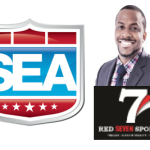

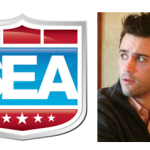
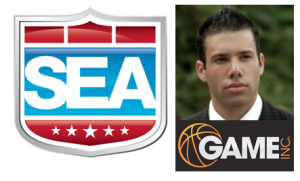
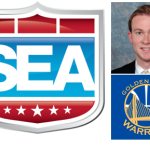

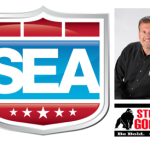

Very interesting approach to mental toughness. I also work and live in Burbank, and living here you really gotta take the bull by the horns and take what you want. Of course this is even true in the carpet cleaning business
Thank you for every other informative website. The place else may just I get that kind of info written in such an ideal method? I’ve a venture that I’m simply now running on, and I have been on the look out for such information.
Berpacaran Bikin Illfeel – Saat dua sejo punyali indah di tengah rasanya jika dua di dunia terasanya indah.
Seseorang yang dilihat menumpang, tidak jarang-jarang gaya kekasihan yang dipertunjukkan terlalu berkesan dan membuat orang sekeliling menjadi tidak nyaman.